The following article is a collection of stories told to me by my great uncle aboard the warship USS The Sullivans. Please enjoy this collection of tales describing life aboard a US Navy destroyer.
Life Aboard the USS The Sullivans (DD-537)
Q: What did you do onboard the ship?
A: I operated the ships throttles. I basically sat between the engines and held a level for each engine. When the command came for a particular speed of change in direction, I would adjust the throttles accordingly.
Q: What was it like inside the engine room?
A: Well, like everything else onboard the ship, it was cramped. In addition, the engines caused the room to be pretty warm. There was also the smell of fuel, grease, and other such things. At times it could be pretty unbearable. However, being confined to such conditions caused the crew in the engine room to be pretty close as it gave us all something to gripe about. The setting also made for a good place to torture the newer sailors.
Q: Torture the sailors?
A: Yeah. When new sailors came onboard and were assigned to the engine room, the senior engine room crew members would wait until the weather turned particularly nasty. When the weather was bad, the ship would pitch and roll all over the place. So during these times, a crewmember was sent to the kitchen to retrieve the greasiest pork chop they could find. They would then tie the chop on a string and hang it from a bulkhead right in front of the gauges. Naturally, the order was given that the pork chop was not to be touched. This forced the new recruits to watch the thing sway back and forth on a string. For the poor bastards who still had yet to get their sea legs, this was particularly nauseating. As grease dripped off the thing, you could see them begin gagging before they finally couldn’t take it anymore. They would then make a break for the deck so they could be sick over the side. Once they staggered back to their posts, they then received the mandatory rounds of laughter and insults for being a sissy.
Q: Now that you brought up the pork chop, how was food onboard the ship?
A: It was as good as military food could be, which doesn’t mean it was good at all. However, you soon learned to enjoy it anyway. The biggest complaint that you could have with the dining onboard the ship was the placement of the mess hall. Being a small ship and having its mess all the way forward, the eating experience could be pretty interesting on days when the weather was foul. Food generally ended up all over the floor if it wasn’t held onto by the one eating it. This once again was a source of anguish for those still not accustomed to life onboard a ship. Even when the weather was not bad, you still had to be careful eating. When the ship dropped anchor, the vibrations would cause everything and anything to go bouncing right off the table.
Q: How did the crew get along onboard the ship?
A: To put it simply, you got along. Even if you hated someone, you were forced to get along in the end. The Fletcher class was a cramped ship. You basically worked elbow to elbow with everyone. Because of this, you eventually got to a point where you knew everyone. The engine crew knew the gunners and the captain knew the cook’s first name. Because of this, life onboard the ship was actually pretty lax. The captain would allow you to do pretty much anything as long as it didn’t interfere with your duties. I remember the crew would often run around shirtless when it was hot and you only had to wear the full uniform when it was time for inspections. If an admiral ever came onboard and saw us like that, he probably would have had us all beaten. I doubt you could have gotten away with things like that onboard a carrier or battleship
Q: What other things could you get away with?
A: Many, many things. One of the more interesting things I remember was when we went fishing with the ships cable. You see, because we threw scraps of food and other things over the side, we were always followed by sharks or other large fish. So one of the crew members gets the bright idea to catch one of those fish. After a day in port, he came onto the ship with a large fishing hook. Once the ship had gotten underway and the sharks began following us, he attached the hook to the steel cable, baited it with a chuck of meat he stole from the cook, and dropped it overboard. Then members of the crew unhooked the winch and allowed the hook to drop behind the ship. We drug hook for the better part of two hours.
Q: Did you catch anything?
A: Did we ever! Right when we began believing that all the effort had been wasted, the line when completely tight. It was like everyone went to battle stations, everyone ran to man the winch and begin hauling in our catch. Others manned boathooks to bring onboard our catch. However, once he got the hook in close, we found out we went in over our heads.
Q: How so?
A: We hooked a great white shark. It was a monster too. The beam of our ship was only about 40 feet across, so we figured this beast was 20 to 25 feet long in relation to our beam. Of course, the commotion attracted everyone to the back of the ship. We didn’t know what to do with the thing. Finally, a senior officer arrived and after demanding to know just what in the hell we were thinking, he ordered us to cut the cable. We didn’t get in trouble, but the officers made it clear that should we attempt to fish like that again, someone was going overboard to remove the hook themselves.
Q: So tell me what Korea was like?
A: Korea was an interesting experience. Because we were used mainly for escort, our ship was everywhere. We would escort carriers one day and then a battleship another. Carriers were a world apart from the destroyers. At one point, a sailor became violently ill and we did not have the means to treat him. So we had to transfer him over to a carrier. A line was hooked to the carrier from our destroyer. The sailor who had taken ill was placed into the basket. Another sailor and I were chosen to hold him steady as the basket was winched across the water to the carrier. While they treated the sailor, I was free to roam the ship. Unlike a destroyer, which is impossible to get lost in, the carrier was another story. I got lost in the damn thing. Finally I was able to find an off duty sailor to point me in the right direction. While the sick sailor recovered, we were motored back to our ship.
Q: Any interesting stories involving the battleships you escorted?
A: No, not really. They were something else to watch though. We would escort them on fire missions. Seeing those big guns fire was something indescribable. By comparison our little 5″ guns could have been pellet rifles compared to those behemoths. You could feel the concussions as the guns fired even deep inside our destroyers. I would stand on deck when off duty to watch them. You could actually see the shells as they left the barrels and travelled toward the coast. It sounded like a freight train barreling across the sky.
Q: Did you ship take part in bombardment missions?
A: On a few occasions yes. Railways and locomotives were our primary targets. Things too small and insignificant for the larger ships to waste shells on. We would cruise up and down a stretch of coast, monitoring the railways. Whenever we spied a target, we would begin firing. For the most part it was tedious work as a section of railway destroyed one day was repaired again the next. There never was any real attempt to prevent us from destroying the track in the first place. Only once did we come under fire and that turned into a major fiasco.
Q: When was this?
A: On Christmas Day of 1952, we were ordered to destroy a section of railway and a bridge that was in operation. We were ordered to maintain a set distance from the beach by command. However, our initial shelling did not cause any damage. Finally, our captain became impatient and ordered the ship to approach closer. No sooner had we passed the line that we were not supposed too, the entire mountain lit up with flashes. Immediately artillery fire began falling around the ship. Our gunners scrambled to return fire and I remember the captain screaming at the engine room to get us out of there. I pushed the throttles forward too quickly, so the propellers didn’t bite the water quick enough. The ship began to fishtail all over the place as we backtracked. It was then that the captain screamed at me, asking what the hell I was doing. So I had to throttle back and allow the ship to come under control again. When we finally got out of the area, we went on deck and found pieces of shells all over the decks. Thankfully, we did not get hit.
Q: Did you at least hit your target?
A: As wildly as we were moving across the water, I doubt we managed to hit the bridge or any of the guns that fired on us. However, we were later told that we were able to take the bridge out. We left the area the next day, but a Canadian Destroyer then destroyed other sections of the railroad that night. It was certainly, the most memorable experience onboard that shop. Afterwards, we made preparations to sail back to the states. I finished my service onboard the ship shortly after we arrived home.
Q: So did you enjoy life onboard the ship?
A: Oh yes, it was the greatest time of my life. I met some good people and that ship built lasting friendships. I will never forget the places I went and the sights that I saw. Though my ship had its flaws, I still would not change a thing. If I could I would gladly do It again.
The Five Sullivan Brothers, the namesake of the USS The Sullivans.
Further Links
Want to follow Navy General Board on Social Media? Check us out on the platforms below!
More Great Articles
The biggest Cruisers of World War II.
Life aboard a US Navy Battleship During the Korean War.
Why were so many Warships Never Built?
The Iowa Class Battleship, A Departure from Traditional Design

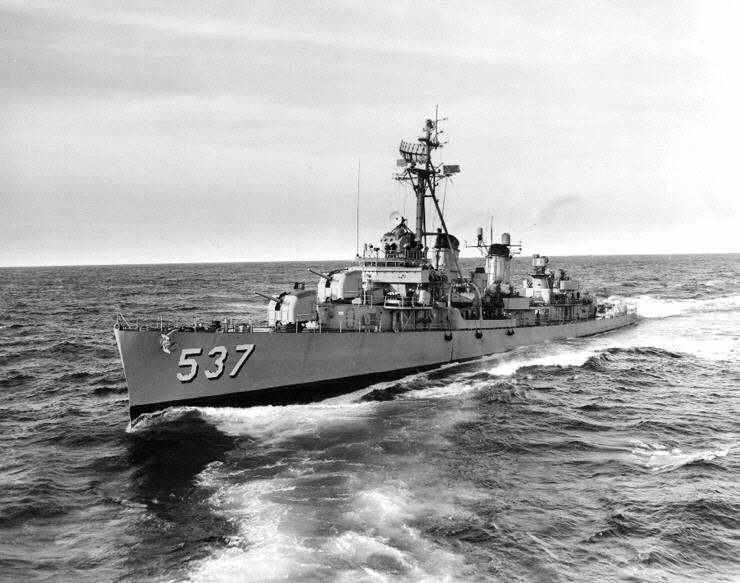
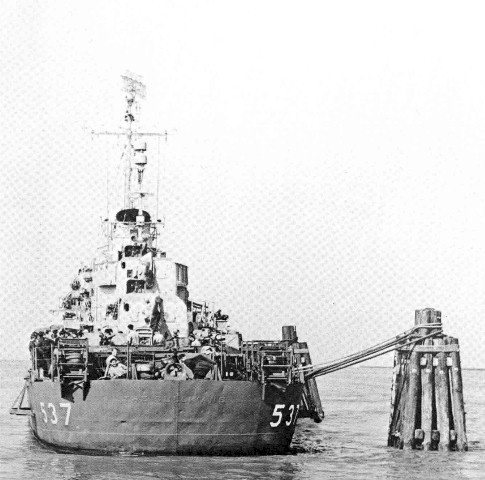
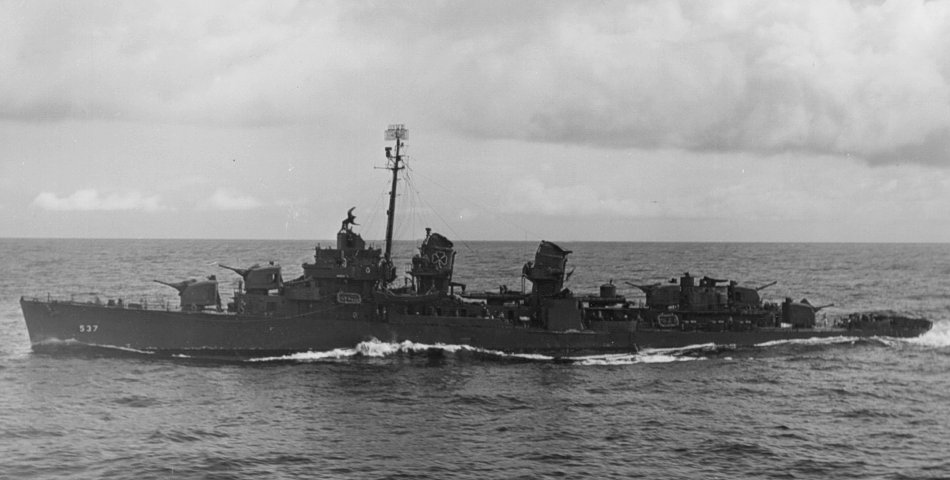
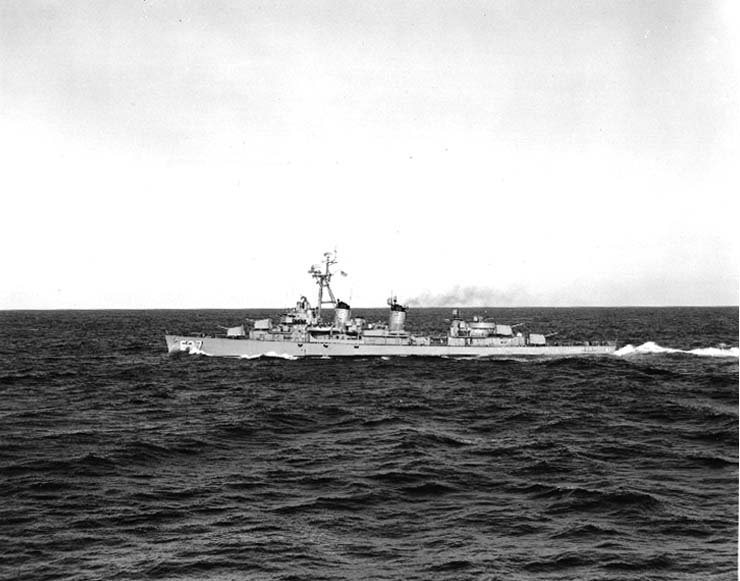
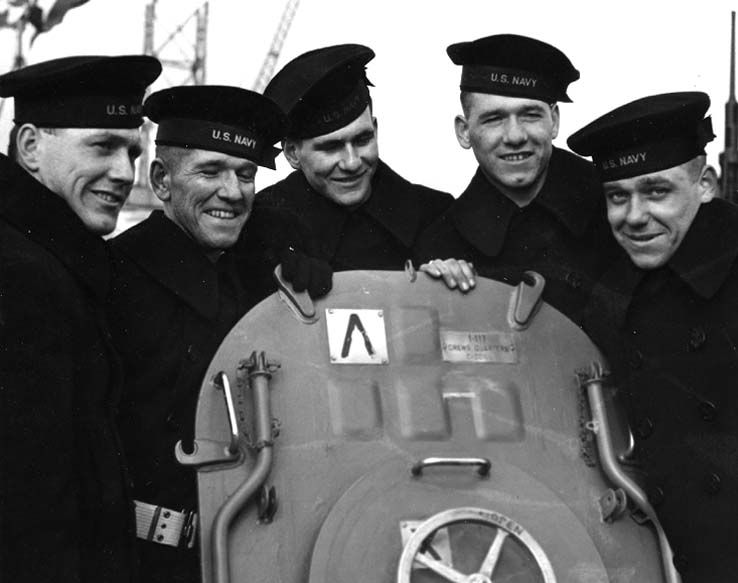

Recent Comments